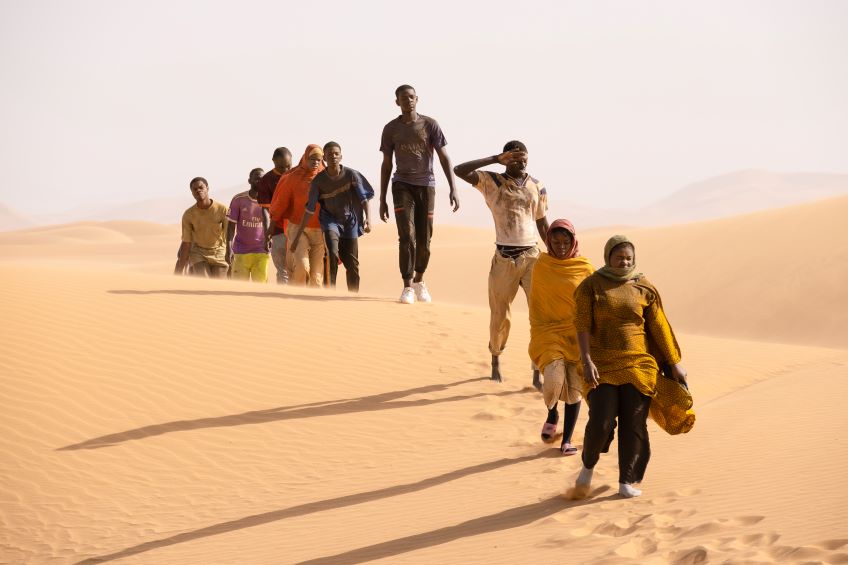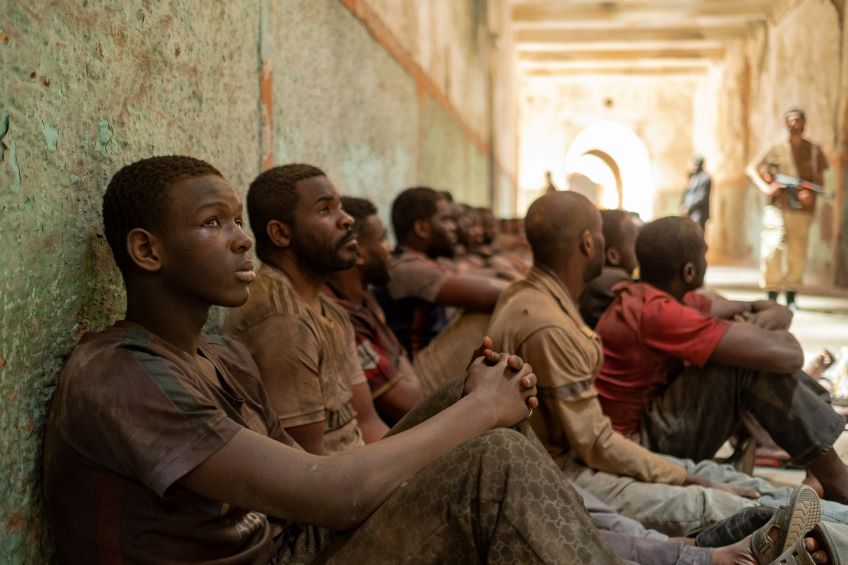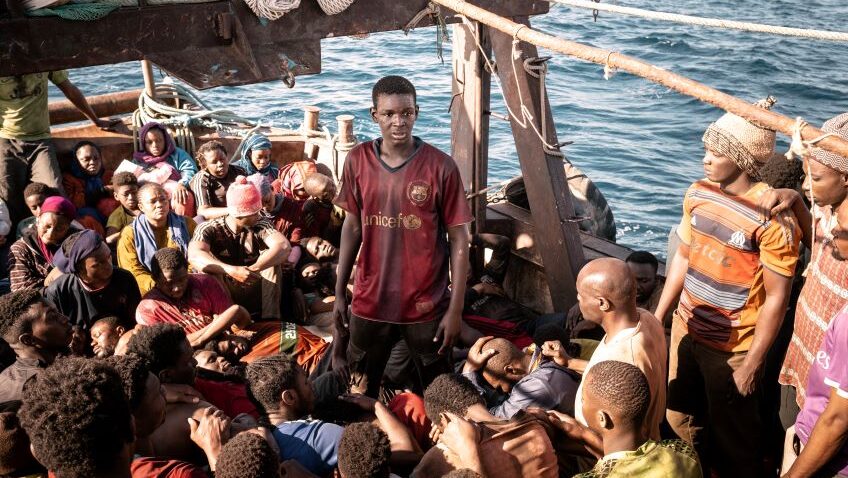Joyce Glasser reviews Io Capitano (April 5, 2024), Cert 15, 121 mins. in cinemas
If you’ve seen Matteo Garrone’s Italian crime dramas Gomorrah or Dogman or even his extraordinary Pinocchio in 2020, you will expect an immersive experience: a trenchant, powerful, flawlessly acted and beautifully shot film. As co-writer, director and producer of Io Capitano (Me, Captain), Garonne takes us on a journey that is so authentically told it is, at times, hard to watch, and yet the journey and the cast of characters are familiar to Western audiences while the solutions to the predicament they present remain insurmountable.
That’s not to say Garrone is not on new ground himself. This is his first film shot outside of his native Italy, and though he has made one English language film (Tale of Tales), here he is shooting in French and Wolof, a language he doesn’t speak. He is a white European telling a story about Africans who have undergone the journey he is dramatizing.
Teenagers Seydou (Seydou Sarr) and Moussa (Moustapha Fall) are Senegalese cousins who have a rap band in the slums of Dakar. Seydou has close family ties and loves his musical, fun-loving, yet responsible and wise single mother (Khady Sy) and his younger siblings. Through magazines, films and the internet he is consumed with tantalising images of Europe. He dreams of earning money with his music in Europe that would free his mother and siblings from a life of poverty.
The cousins work and save, and, despite the strong warnings of a village elder, they buy cheap false passports and sneak away to Tripoli, the gateway to Italy. The film was shot in the Saharan desert and then Casablanca and Morocco, substituting for Libya and Niger, where war prevented filming.

Along the way, the boys become disillusioned very quickly, aware they have been conned. They are just about left to fend for themselves when marching for days in the desert only to be surrounded by the Libyan mafia demanding at gun point all their money and valuables.
The boys have been warned to stuff their money in their bums, a tactic difficult enough but the thugs are wise to it. Seydou miraculously gets away with pleading poverty, but Moussa’s lie is discovered and he is taken away – possibly to be shot. Seydou ends up in a prison that compares unfavourably with Guantanamo Bay. If he does not reveal his mother’s mobile phone number for ransom he will be tortured until he talks, even to death.
Seydou is determined not to talk to spare his mother. We have already seen how he risks his life to save an older woman who collapses in the desert, an episode enhanced with sparsely used magical realism that is our first hint Seydou is a candidate for migrant sainthood. One of the tensest scenes in the film, we are on tenterhooks until the twist that takes Seydou on to his next station in this purgatory.
In arguably the best scene in the film, Seydou finds a father figure in Martin, an older man who shows him a photo of a son he might never see again, a boy Seydou’s age. In hope of saving their skins, Martin tells his sellers that he and Seydou are carpenters, a skill a wealthy Libyan with an unfinished mansion needs. And so the pair are sold into slavery, with the Libyan millionaire’s fixer dangling freedom and a ride to Tripoli as their reward for building a wall and a fountain. Martin is played by Issaka Sawagodo, 60, a professional actor from Burkina Faso who adds pathos without sentimentality to the growing relationship between the two slaves.

Though Garrone worked with three writers, the stories come from several Africans who made the arduous journey to Europe and two of them, Mamadou Kouassi and Amara Fofana, are consultants on the film. The motivations, background and experiences of the two lead characters – played by non-professional Senegalese rappers Garrone found in auditions – are a composite of those of several teenage boys he spoke to or heard about from his consultants.
Garrone also heard the story of a teenager pressured by the traffickers into commandeering a boat to Italy, a story from which the title derives. Seydou argues he’s never been on a boat and cannot even swim, as if the trafficker cares. When Seydou sees the women and children on the boat, however, he tells the trafficker he cannot take responsibility for so many lives. But Seydou now has a boy dying of an infected gunshot wound to think of and this boy’s only hope is to reach Italy urgently.
Western countries can barely process the hundreds of thousands of applications from desperate migrants escaping wars for which we bear some responsibility and the despotic or terrorist regimes in Afghanistan, Hong Kong, Ukraine, Syria, Iran, etc. – and of course Haiti and Gaza. Where on this scale are those who are not so much escaping torture and death as risking it to find a better life?
Seydou and Moussa are economic migrants. Yet their only crime is trying to reach Italy, to provide a better life for them and their families. We are swayed by their youth, good looks, honest ambition, their innate goodness and our humanity. Seydou is not just well brought up. He is so polite, caring, and altruistic the only thing missing is a halo. Io Capitano is so riveting and convincing that your emotional reaction cannot but overwhelm your intellectual response.




